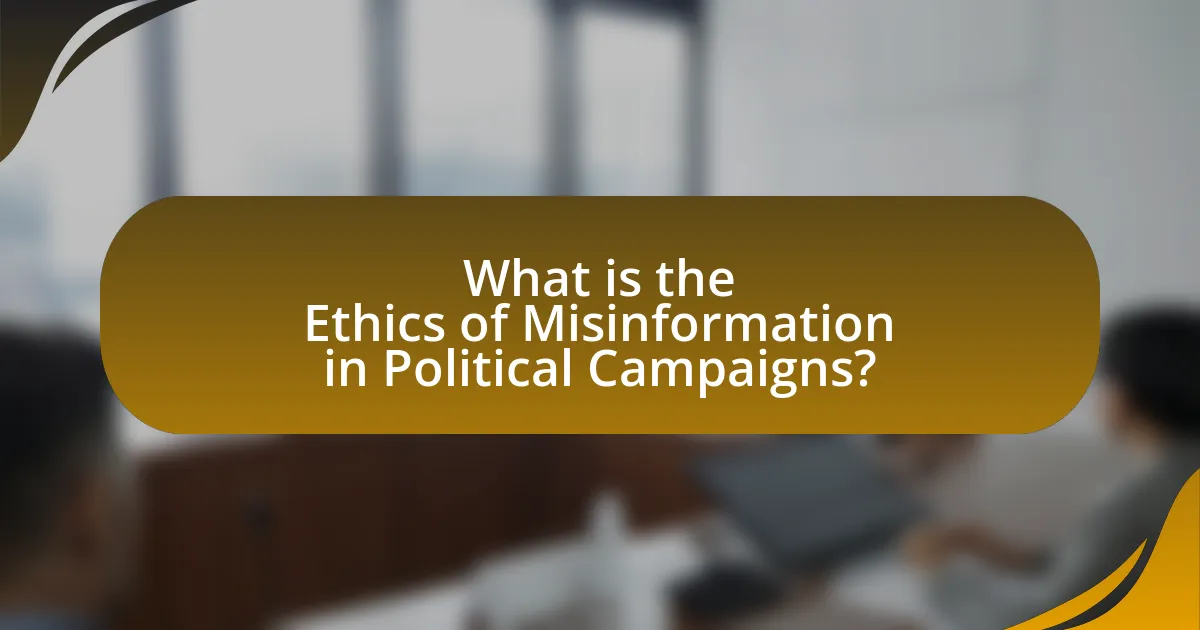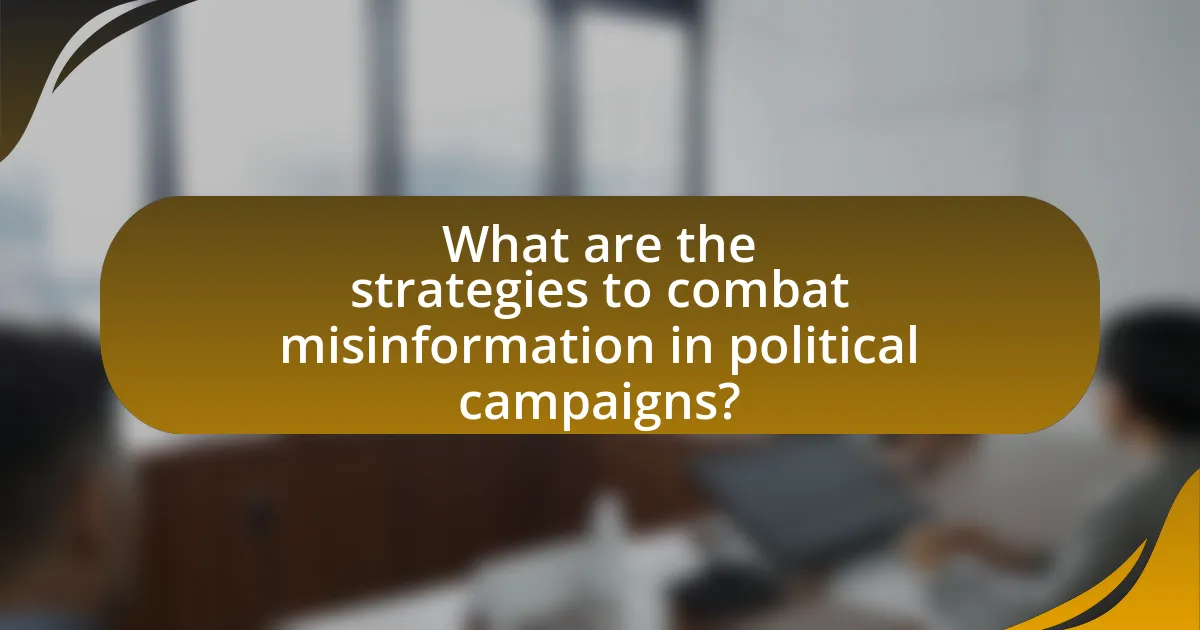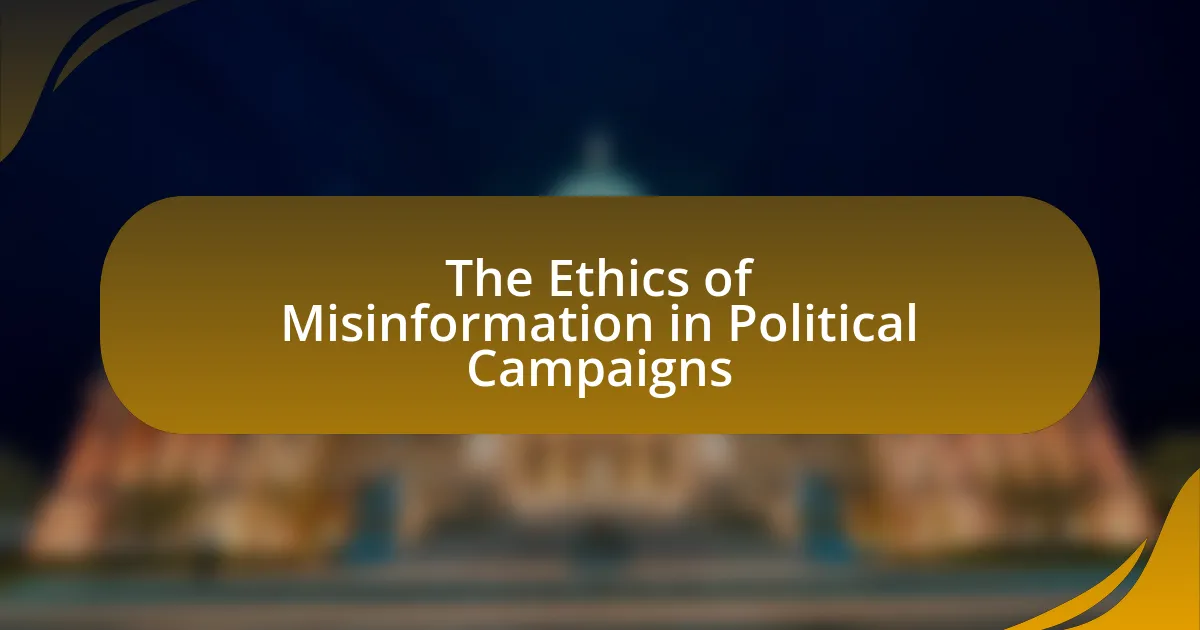The article examines the ethics of misinformation in political campaigns, highlighting the moral implications of spreading false information to influence public opinion and electoral outcomes. It discusses the significance of misinformation in undermining democratic processes, eroding trust in institutions, and manipulating voter behavior, with historical examples illustrating its impact. The rise of digital media is analyzed for its role in amplifying misinformation, while ethical principles such as honesty, accountability, and transparency are emphasized as essential for maintaining integrity in political discourse. Additionally, the article explores strategies for combating misinformation, the responsibilities of political candidates, and the importance of media literacy in fostering an informed electorate.

What is the Ethics of Misinformation in Political Campaigns?
The ethics of misinformation in political campaigns involves the moral implications of spreading false or misleading information to influence public opinion and electoral outcomes. This practice undermines democratic processes, erodes trust in institutions, and can lead to significant societal harm, as evidenced by the rise of fake news during the 2016 U.S. presidential election, which was shown to have affected voter perceptions and behaviors. Ethical frameworks, such as utilitarianism and deontological ethics, argue against misinformation, emphasizing the responsibility of political actors to provide truthful information to the electorate.
Why is the ethics of misinformation significant in political contexts?
The ethics of misinformation is significant in political contexts because it directly impacts democratic processes and public trust. Misinformation can manipulate voter perceptions, leading to distorted electoral outcomes and undermining the integrity of democratic institutions. For instance, studies have shown that false information can sway public opinion and influence election results, as evidenced by the 2016 U.S. presidential election, where misinformation spread through social media played a crucial role in shaping voter behavior. This manipulation not only affects individual choices but also erodes trust in media and political systems, creating a polarized society where informed decision-making is compromised.
What are the historical examples of misinformation in political campaigns?
Historical examples of misinformation in political campaigns include the 1930s “Daisy” ad by Lyndon B. Johnson, which falsely implied that Barry Goldwater would lead the U.S. to nuclear war, and the 2004 Swift Boat Veterans for Truth campaign, which spread misleading information about John Kerry’s military service. The “Daisy” ad, aired during the 1964 presidential election, utilized emotional manipulation to create fear, while the Swift Boat campaign, funded by political opponents, aimed to undermine Kerry’s credibility through fabricated claims. These instances illustrate how misinformation has been strategically used to influence public perception and electoral outcomes.
How has the rise of digital media influenced misinformation ethics?
The rise of digital media has significantly influenced misinformation ethics by amplifying the speed and reach of false information, which complicates ethical standards for truthfulness and accountability. Digital platforms enable rapid dissemination of misleading content, often outpacing fact-checking efforts and creating an environment where misinformation can thrive. For instance, a study by the Massachusetts Institute of Technology found that false news stories spread six times faster than true stories on Twitter, highlighting the challenges in maintaining ethical standards in the face of such dynamics. This shift necessitates a reevaluation of ethical frameworks to address the responsibilities of digital media platforms, content creators, and consumers in mitigating the impact of misinformation during political campaigns.
What are the key ethical principles related to misinformation?
The key ethical principles related to misinformation include honesty, accountability, and transparency. Honesty requires that information shared in political campaigns is accurate and truthful, as misinformation can mislead voters and distort democratic processes. Accountability emphasizes the responsibility of individuals and organizations to correct false information and face consequences for spreading it. Transparency involves openly disclosing sources and intentions behind the information presented, allowing voters to critically assess the credibility of the claims made. These principles are essential in maintaining the integrity of political discourse and ensuring informed decision-making among the electorate.
How do honesty and transparency play a role in political campaigning?
Honesty and transparency are crucial in political campaigning as they build trust between candidates and voters. When candidates present truthful information and openly share their policies, they foster a sense of credibility that can significantly influence voter behavior. Research indicates that campaigns characterized by honesty can lead to higher voter engagement and support; for instance, a study by the Pew Research Center found that 70% of voters consider honesty a key factor in their voting decisions. Furthermore, transparency regarding campaign financing and decision-making processes can mitigate concerns about corruption and enhance public confidence in the electoral system. Thus, honesty and transparency not only shape the ethical landscape of political campaigns but also directly impact their effectiveness and the overall health of democracy.
What responsibilities do political candidates have regarding truthful information?
Political candidates have the responsibility to provide truthful information to the public during their campaigns. This obligation is rooted in ethical standards and legal frameworks that aim to ensure transparency and accountability in the electoral process. For instance, the Federal Election Commission mandates that candidates must not knowingly misrepresent facts about themselves or their opponents, as such actions can mislead voters and undermine democratic integrity. Additionally, research from the Pew Research Center indicates that misinformation can significantly affect public trust in political institutions, highlighting the importance of candidates adhering to truthful communication to foster an informed electorate.
What are the implications of misinformation on democracy?
Misinformation undermines democracy by eroding public trust in institutions and distorting the electoral process. When citizens are exposed to false information, their ability to make informed decisions is compromised, leading to polarization and manipulation of public opinion. For instance, a study by the Pew Research Center found that 64% of Americans believe that fabricated news stories cause confusion about the basic facts of current events, which can influence voting behavior and civic engagement. Furthermore, misinformation can facilitate the spread of extremist ideologies, as seen in various elections worldwide, where false narratives have swayed voter sentiment and disrupted democratic norms.
How does misinformation affect voter behavior and decision-making?
Misinformation significantly alters voter behavior and decision-making by creating confusion and influencing perceptions of candidates and issues. Studies indicate that exposure to false information can lead voters to make decisions based on incorrect beliefs, ultimately skewing election outcomes. For instance, research published in the journal “Nature” by Vosoughi, Roy, and Aral (2018) found that false news spreads more rapidly on social media than true news, affecting public opinion and voter turnout. This manipulation of information can result in voters supporting candidates or policies that do not align with their actual preferences or values, thereby undermining the democratic process.
What are the long-term consequences of misinformation on public trust?
The long-term consequences of misinformation on public trust include a significant erosion of confidence in institutions and media. When individuals are repeatedly exposed to false information, they may develop skepticism towards credible sources, leading to a decline in civic engagement and participation. Research indicates that misinformation can create polarized communities, where individuals trust only information that aligns with their pre-existing beliefs, further fragmenting societal cohesion. A study by Lewandowsky et al. (2012) highlights that misinformation can persist even after corrections are issued, demonstrating its lasting impact on public perception and trust in democratic processes.
How can we identify misinformation in political campaigns?
Misinformation in political campaigns can be identified by verifying the accuracy of claims through fact-checking organizations and cross-referencing credible sources. Fact-checking organizations, such as PolitiFact and FactCheck.org, assess the truthfulness of statements made by political figures and provide evidence-based evaluations. Additionally, analyzing the context and intent behind the information, as well as checking for corroboration from multiple reputable news outlets, can help discern misleading narratives. Research indicates that misinformation often spreads through social media platforms, where it can be identified by examining the source’s credibility and the presence of sensationalist language.
What tools and resources are available for fact-checking political claims?
Fact-checking political claims can be effectively conducted using various tools and resources such as FactCheck.org, PolitiFact, and Snopes. FactCheck.org, a project of the Annenberg Public Policy Center, provides nonpartisan analysis of political statements and claims, ensuring accuracy in public discourse. PolitiFact, operated by the Poynter Institute, rates the truthfulness of claims made by politicians and public figures on a scale from “True” to “Pants on Fire,” offering transparency in its evaluations. Snopes, known for debunking urban legends and misinformation, also covers political claims, providing context and evidence to clarify the truth. These resources are widely recognized for their commitment to factual accuracy and are frequently cited in academic and journalistic contexts, reinforcing their credibility in the realm of political fact-checking.
How can voters critically evaluate the information presented in campaigns?
Voters can critically evaluate the information presented in campaigns by verifying facts, analyzing sources, and assessing the context of the information. Fact-checking organizations, such as PolitiFact and FactCheck.org, provide independent verification of claims made by candidates, helping voters discern truth from misinformation. Additionally, voters should consider the credibility of the sources providing the information, looking for reputable news outlets and expert analyses rather than partisan or unverified sources. Contextual analysis involves understanding the broader implications of campaign messages, including the motivations behind them and the potential biases present. By employing these strategies, voters can make informed decisions and mitigate the impact of misinformation in political campaigns.

What are the strategies to combat misinformation in political campaigns?
Strategies to combat misinformation in political campaigns include fact-checking, media literacy education, and transparency in communication. Fact-checking organizations, such as PolitiFact and FactCheck.org, actively verify claims made by political figures, providing voters with accurate information. Media literacy education empowers citizens to critically evaluate sources and discern credible information from falsehoods, which is essential in an era of rapid information dissemination. Additionally, political campaigns can enhance transparency by openly sharing their sources and methodologies, fostering trust and accountability. These strategies collectively contribute to a more informed electorate and help mitigate the spread of misinformation.
How can political organizations promote ethical communication?
Political organizations can promote ethical communication by establishing clear guidelines that prioritize transparency, accuracy, and accountability in their messaging. These organizations should implement training programs for their members on ethical communication practices, emphasizing the importance of fact-checking and responsible sourcing of information. Research indicates that organizations that adopt such measures can significantly reduce the spread of misinformation, as seen in the 2020 U.S. elections where campaigns that prioritized factual accuracy experienced higher public trust. By fostering a culture of ethical communication, political organizations can enhance their credibility and contribute to a more informed electorate.
What role do media literacy programs play in combating misinformation?
Media literacy programs play a crucial role in combating misinformation by equipping individuals with the skills to critically analyze and evaluate information sources. These programs teach participants how to discern credible information from false or misleading content, thereby reducing the spread and impact of misinformation. Research indicates that individuals who undergo media literacy training are more likely to identify biased or inaccurate information, as evidenced by a study from the Stanford History Education Group, which found that students who received media literacy instruction improved their ability to evaluate online sources by 50%. This enhanced critical thinking fosters informed decision-making, particularly in the context of political campaigns, where misinformation can significantly influence public opinion and voter behavior.
How can social media platforms be held accountable for misinformation?
Social media platforms can be held accountable for misinformation through regulatory frameworks, transparency requirements, and content moderation policies. Regulatory bodies can impose fines and sanctions on platforms that fail to adequately address the spread of false information, as seen in the European Union’s Digital Services Act, which mandates that platforms take responsibility for harmful content. Additionally, requiring platforms to disclose their algorithms and moderation practices can enhance accountability, allowing users and regulators to assess the effectiveness of their measures against misinformation. Studies have shown that platforms implementing stricter content moderation policies can significantly reduce the spread of false information, reinforcing the need for accountability mechanisms.
What legal frameworks exist to address misinformation in politics?
Legal frameworks addressing misinformation in politics include defamation laws, election laws, and regulations on false advertising. Defamation laws allow individuals or entities to sue for damages if false statements harm their reputation, while election laws, such as the Federal Election Commission regulations in the United States, prohibit false statements about candidates or issues during campaigns. Additionally, some jurisdictions have enacted specific laws targeting misinformation on social media platforms, requiring transparency in political advertising and penalizing the spread of false information. These frameworks aim to protect the integrity of political discourse and ensure accountability for misleading claims.
How do laws vary across different countries regarding misinformation?
Laws regarding misinformation vary significantly across countries, reflecting differing cultural, political, and legal frameworks. For instance, countries like Germany and France have stringent laws against hate speech and misinformation, imposing fines and penalties for spreading false information, particularly during elections. In contrast, the United States has a more lenient approach, where misinformation is often protected under free speech rights, although some states have enacted laws targeting specific types of misinformation, such as false advertising or election-related falsehoods. Additionally, countries like Singapore have implemented specific legislation, such as the Protection from Online Falsehoods and Manipulation Act, which allows the government to order the removal of false information and impose penalties on offenders. These variations illustrate how legal responses to misinformation are shaped by national priorities and values, with some nations prioritizing public safety and electoral integrity over free expression.
What are the challenges in enforcing laws against misinformation?
Enforcing laws against misinformation faces significant challenges, primarily due to the rapid evolution of digital communication and the subjective nature of truth. The internet allows misinformation to spread quickly and widely, making it difficult for authorities to track and regulate. Additionally, defining what constitutes misinformation can be complex, as it often involves interpreting intent and context, which varies across different cultures and political landscapes. Legal frameworks may also struggle to keep pace with technological advancements, leading to gaps in enforcement capabilities. Furthermore, there are concerns about infringing on free speech rights, as laws against misinformation must balance regulation with the protection of individual expression. These factors collectively hinder effective enforcement and create a contentious environment for addressing misinformation in political campaigns.

What are the best practices for ethical campaigning?
The best practices for ethical campaigning include transparency, honesty, and respect for opponents and voters. Campaigns should provide clear and accurate information about their policies and positions, avoiding misleading statements or exaggerations. For instance, the American Association of Political Consultants emphasizes the importance of truthfulness in advertising and communication, which fosters trust among constituents. Additionally, campaigns should engage in respectful discourse, refraining from personal attacks or inflammatory rhetoric, as this promotes a healthier political environment. Research indicates that ethical campaigning not only enhances public trust but also leads to more informed voter decisions, ultimately strengthening democracy.
How can candidates ensure their messaging is truthful and responsible?
Candidates can ensure their messaging is truthful and responsible by adhering to factual accuracy and transparency in their communications. This involves verifying information before dissemination, using credible sources, and providing context to avoid misleading interpretations. For instance, a study by the Pew Research Center found that 64% of Americans believe that misinformation is a significant problem in political campaigns, highlighting the need for candidates to prioritize truthfulness to maintain public trust. Additionally, candidates should engage in fact-checking practices and be open to correcting any inaccuracies promptly, which reinforces accountability and ethical standards in their messaging.
What guidelines should be followed to avoid spreading misinformation?
To avoid spreading misinformation, individuals should verify information through credible sources before sharing it. This involves cross-referencing facts with established news organizations, academic institutions, or official statements. For instance, a study by the Pew Research Center found that 64% of Americans believe that misinformation is a major problem, highlighting the importance of fact-checking. Additionally, individuals should be cautious of sensational headlines and emotional appeals, as these often indicate unreliable content. By adhering to these guidelines, the risk of disseminating false information can be significantly reduced.
How can transparency in campaign financing contribute to ethical practices?
Transparency in campaign financing enhances ethical practices by ensuring accountability and reducing corruption. When campaign contributions are publicly disclosed, it allows voters to understand the financial influences behind candidates, fostering informed decision-making. Studies, such as the one conducted by the Brennan Center for Justice, indicate that transparency can lead to decreased instances of unethical behavior, as candidates are less likely to engage in corrupt practices when they know their funding sources are visible to the public. This visibility promotes trust in the electoral process and encourages candidates to prioritize the interests of their constituents over special interests.
What role do voters play in promoting ethical standards in political campaigns?
Voters play a crucial role in promoting ethical standards in political campaigns by holding candidates accountable for their actions and statements. When voters prioritize integrity and transparency, they influence candidates to adopt ethical practices to gain support. Research indicates that public scrutiny, such as fact-checking and demanding accountability, can deter misinformation and unethical behavior in campaigns. For instance, a study by the Pew Research Center found that 64% of voters believe that fact-checking influences candidates’ behavior, demonstrating that informed voters can effectively promote ethical standards.
How can voters advocate for accountability in political messaging?
Voters can advocate for accountability in political messaging by actively demanding transparency and fact-checking from candidates and political parties. This can be achieved through organized campaigns that encourage the use of independent fact-checking organizations, which have been shown to reduce the spread of misinformation by providing verified information to the public. For instance, a study by the Pew Research Center found that fact-checking can significantly influence public perception and behavior regarding political claims. Additionally, voters can engage in discussions on social media platforms to challenge misleading statements and promote accurate information, thereby fostering a culture of accountability in political discourse.
What actions can individuals take to support ethical campaigning?
Individuals can support ethical campaigning by critically evaluating information before sharing it. This involves fact-checking claims made by candidates and organizations, utilizing reputable sources such as fact-checking websites like Snopes or PolitiFact, which have been shown to reduce the spread of misinformation. Additionally, individuals can engage in discussions that promote transparency and accountability in political messaging, encouraging candidates to disclose their funding sources and the origins of their information. By participating in community forums and advocating for policies that regulate misinformation, individuals can further contribute to a culture of ethical campaigning.
